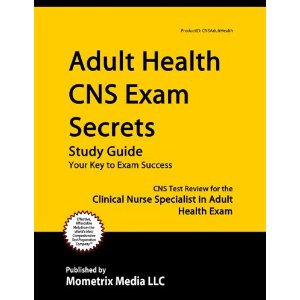ANCC CNS Adult Health Exam Study Guide
June 6, 2011 by Rn2b
Filed under Clinical Nurse (CNS), Nursing Books, Testing and Exam Help
A Clinical Nurse Specialist (CNS) is an advanced practice nurse, and they focus on a specialized area. They work in different medical environments, such an emergency rooms, operating rooms, or can deal with clinical or surgical procedures.
While similar to the rule of a Nurse Practitioner, a CNS is more complex. They do research and education requirements for patients to receive the best care possible, and must create solutions for the nursing staff.
Not only must a CNS have certification from the American Nurses Credentialing Center (ANCC) in CNS, they must also be a Registered Nurse (RN). The ANCC has different certifications, such as Adult Health, Pediatrics, Psychiatry and Mental Health, and more. The most commonly taken is the Adult Health Exam.
 For the Adult Health CNS Exam, many CNS nurses recommend study guides like Adult Health CNS Exam Secrets Study Guide: Your Key to Success: CNS Test Review for the Clinical Nurse Specialist in Adult Health Exam. Each topic is researched and explained in easy ways, and includes reviews to help you prepare.
For the Adult Health CNS Exam, many CNS nurses recommend study guides like Adult Health CNS Exam Secrets Study Guide: Your Key to Success: CNS Test Review for the Clinical Nurse Specialist in Adult Health Exam. Each topic is researched and explained in easy ways, and includes reviews to help you prepare.
Pros and Cons Concerning Institutional Nursing
December 26, 2008 by Rn2b
Filed under Clinical Nurse (CNS), General Nurse Information, Types of Nurses
Pros and Cons Concerning Institutional Nursing
Nursing in hospitals and related health facilities such as extended care facilities, nursing homes, and neighborhood clinics, comprises all of the basic components of comprehensive patient care and family health. The concept of the modern hospital as a community health center where in-patient and out-patient care are continuous describes the goal of medical care in most general hospitals.
The educational qualification for beginning practitioners is a Bachelor of Science in Nursing degree. The nurse, as member of the health care team, participates in all phases of patient care of the acutely ill, the convalescing and the ambulatory patient. The nurse cares for the patient in the hospital or in the out- patient department and plans for the nursing care needs of the patient about to be discharged.
Advantages of Staff Nursing in Hospitals
1. There is always a supervisor whom one can consult if a problem exists.
2. Nurses are updated with new trends in medicine and in the nursing care of patients.
3. They have a forty- hour week duty which provide for two days of rest away from duty.
4. More staff development programs are available in hospitals.
5. They undergo rotation to different units.
Disadvantages of Staff Nursing in Hospitals
1. There is a great possibility of under-staffing which may require nurses to put in overtime work and sacrifice some of their plans.
2. Because of the bulk of work, some staff nurses do not find time to improve their skills through continuing education programs.
3. Administrative problems and overwork may tend to dissatisfy the staff nurse.
What is a Clinical Nurse Specialist?
December 23, 2008 by Rn2b
Filed under Clinical Nurse (CNS), Finding Your Nursing Job, Nurse Programs
What is a Clinical Nurse Specialist?
Educators first developed the clinical nurse specialist (CNS) role because of their concern for improving nursing care. They believed that improvement was dependent upon increasing expertise at the bedside, giving direct and indirect care, and incorporating role modeling and consultation
The role of a CNS has evolved to include many specialties particularly in psychiatric care. The impressive development of this masteral program helped to initiate the other CNS specialty courses. Thus, clinical specialization in graduate education increased tremendously. Graduates would provide a high level of specialized nursing care and serve as change agents in hospital settings.
A good portion of time is spent in the hospital, in both staff and patient/family education. A clinical nurse specialist is also into developing protocols, standards and pathways that will guide nursing practice. A CNS also serves as a direct care provider, educator/consultant, researcher and leader. Areas of focus can encompass adult, pediatric and obstetric patients. Different medical departments like oncology, the cardiopulmonary system, the pulmonary system and others are also included.
What are the competencies attributed to a CNS?
• In-depth knowledge expertise
• Demonstrating clinical expertise in a selected area of clinical practice.
• Can be emulated by others professionally and personally.
• Serving as practitioner/teacher, consultant and researcher.
The past years had seen the influx of the greatest percentage of APNs as clinical nurse specialists. In order to achieve this specialization, one should prepare for a graduate nursing education program. This is primarily hospital based and can be consultative in nature.

